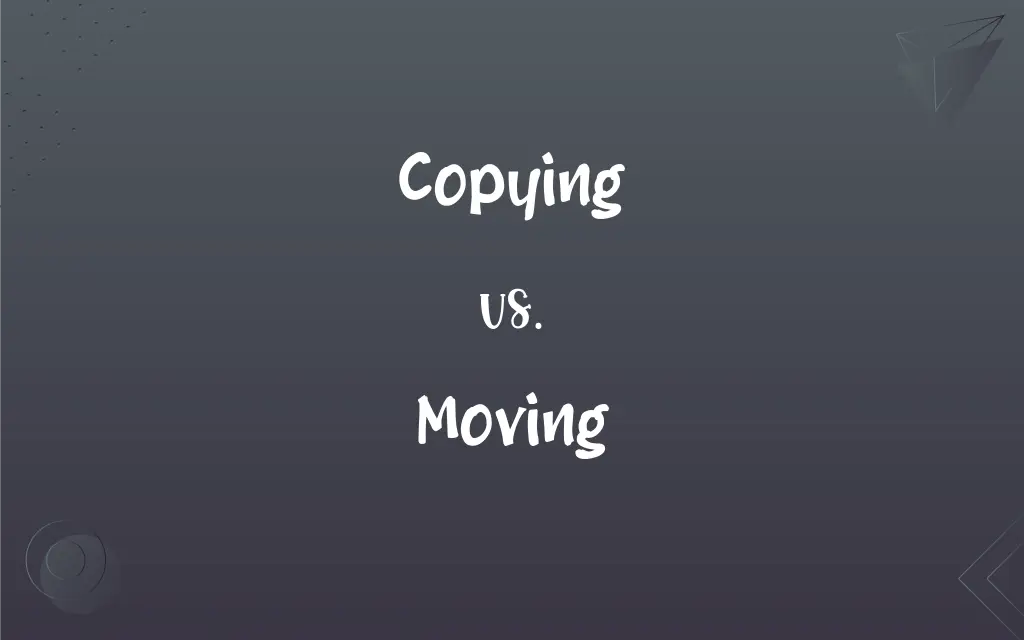Copying vs. Moving: What's the Difference?
Edited by Janet White || By Harlon Moss || Updated on November 18, 2023
Copying creates a duplicate of an item while leaving the original intact; moving relocates the item from one place to another without leaving a duplicate.

Key Differences
Copying involves creating an exact replica of a particular item, be it a file, a document, or any object, while the original item remains unchanged in its initial location. On the contrary, moving entails the transfer or relocation of an item from its original position to a new one, without leaving behind a duplicate.
Copying ensures that the original item is preserved, often providing a backup or an opportunity for distribution. Moving, however, changes the original location of the item, which might be essential for organization or restructuring purposes.
In digital contexts, copying a file means there will be two instances of that file, often in different folders or devices. With moving, the file exists only in the new location, and no longer in its original spot.
The actions of copying and moving might seem similar, as both deal with item placement. However, the primary distinction lies in the presence (or absence) of a duplicate item post-action. Copying results in two identical items, whereas moving results in a single relocated item.
Comparison Chart
Definition
Creating a duplicate of an item.
Relocating an item to a new location.
ADVERTISEMENT
Result
Two identical items exist.
Item exists only in the new location.
Purpose
Backup, distribution, preservation.
Organization, restructuring.
Digital Context
File remains in the original directory.
File is no longer in the original directory.
Physical Context
Replica is made, original stays intact.
Original item changes location.
Copying and Moving Definitions
Copying
Imitating or following as a model.
The students were copying the teacher's example.
ADVERTISEMENT
Moving
Changing the position or location of something.
They are moving to a new house next month.
Copying
Producing a duplicate of an original item.
He was copying the painting for his art project.
Moving
Causing emotional or profound feelings.
The film was so moving that she cried.
Copying
Creating a backup by duplication.
I am copying my files to an external drive.
Moving
Progressing or advancing towards a goal.
The project is moving in the right direction.
Copying
Replicating something exactly.
She was copying her friend's homework.
Moving
Being active or in motion.
The gears inside the clock are constantly moving.
Copying
Reproducing without originality.
The brand was accused of copying a popular design.
Moving
In the process of relocating residence or business.
Their store is moving to a bigger location downtown.
Copying
An imitation or reproduction of an original; a duplicate
A copy of a painting.
Made two copies of the letter.
Moving
Changing or capable of changing position
A moving target.
Copying
(Computers) A file that has the same data as another file
Stored on the server a copy of every document.
Moving
Relating to or involved in a transfer of furnishings from one location to another
Moving expenses.
Moving van.
FAQs
If I move a file, is the original still there?
No, moving a file removes it from the original location.
What does copying mean?
Copying means creating a duplicate of an original item.
Why might one choose copying over moving?
Copying is chosen for backup, distribution, or when the original needs to be preserved.
Can copying refer to imitating behaviors or actions?
Yes, copying can mean imitating or replicating actions, behaviors, or styles.
What is moving?
Moving is relocating an item from one place to another.
Does copying consume more storage in digital contexts?
Yes, since copying creates a duplicate, it uses additional storage.
Does moving always refer to physical relocation?
No, moving can also describe emotional responses or progress towards a goal.
Why would I copy a file instead of moving it?
Copying is useful if you want to retain the original or share the file without losing it.
Is copying always a direct duplicate?
In most contexts, yes, but it can also imply a close imitation or approximation.
If I copy a file, does it change the original?
No, copying leaves the original file unchanged.
What happens if I move a file to a location with a file of the same name?
Usually, you'll be prompted to replace the existing file or keep both.
Is copying only related to tangible items?
No, copying can relate to both tangible items, like papers, and intangible ones, like digital files.
Does copying create a duplicate?
Yes, copying results in a duplicate, leaving the original intact.
Is moving faster than copying digitally?
Generally, moving is faster as it doesn't require duplicating content.
What's the main difference between copying and moving?
Copying creates a duplicate, while moving relocates without leaving a duplicate.
Do both copying and moving alter file timestamps?
Moving generally retains the timestamp, while copying might create a new timestamp based on when the copy was made.
Does moving imply a permanent change?
Not always, items can be moved and then moved back or to another location.
In which contexts are copying and moving used most often?
Copying and moving are commonly used in file management, art, literature, and everyday organizational tasks.
Can moving mean transferring between devices?
Yes, in digital contexts, moving can refer to relocating data between devices.
In which context is moving typically preferred?
Moving is preferred for organization, restructuring, or when duplicates are unnecessary.
About Author
Written by
Harlon MossHarlon is a seasoned quality moderator and accomplished content writer for Difference Wiki. An alumnus of the prestigious University of California, he earned his degree in Computer Science. Leveraging his academic background, Harlon brings a meticulous and informed perspective to his work, ensuring content accuracy and excellence.
Edited by
Janet WhiteJanet White has been an esteemed writer and blogger for Difference Wiki. Holding a Master's degree in Science and Medical Journalism from the prestigious Boston University, she has consistently demonstrated her expertise and passion for her field. When she's not immersed in her work, Janet relishes her time exercising, delving into a good book, and cherishing moments with friends and family.
































































